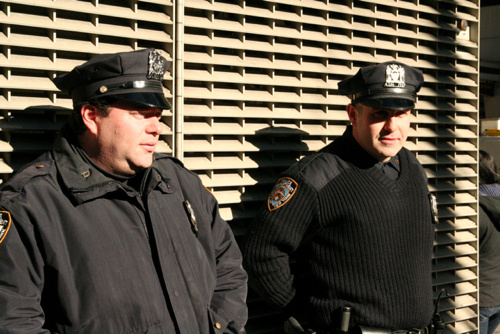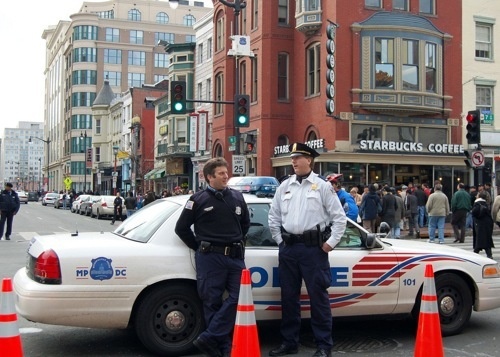Today, most people walk around with a camera of some sort in their possession. Point-and-shoots, DSLRs and tiny video cams--not to mention cellphones--have become ubiquitous. And yet it seems that in many public locations, security officials are touchier than ever about letting people actually use those cameras. Our guardians of public safety often have the idea that shooting pictures in public places might be a precursor to some sort of terrorism. It's an understandable concern, but misguided. I believe there is a good case to be made that having lots of cameras in the hands of citizens makes us more, rather than less, safe.
Here's how bad it has gotten: Not long ago, an Amtrak representative did an interview with local TV station Fox 5 in Washington, D.C.'s Union Station to explain that you don't need a permit to take pictures there--only to be approached by a security guard who ordered them to stop filming without a permit.
Legally, it's pretty much always okay to take photos in a public place as long as you're not physically interfering with traffic or police operations. As Bert Krages, an attorney who specializes in photography-related legal problems and wrote Legal Handbook for Photographers, says, "The general rule is that if something is in a public place, you're entitled to photograph it." What's more, though national-security laws are often invoked when quashing photographers, Krages explains that "the Patriot Act does not restrict photography; neither does the Homeland Security Act." But this doesn't stop people from interfering with photographers, even in settings that don't seem much like national-security zones.
Tennessee law student Morgan Manning has compiled a list of incidents in which individuals were wrongly stopped. Cases like that of Seattle photographer Bogdan Mohora, who was arrested for taking pictures of police arresting a man and had his camera confiscated. Or NASA employee Walter Miller, who was stopped for photographing an art exhibit near the Indianapolis City-County Building and told that "homeland security" forbade photos of the facility. More recently, a CBS news crew was turned back from shooting the oil-fouled gulf coastline by two U.S. Coast Guard officers who said they were enforcing "BP's rules."
Unfortunately, Manning notes, although such hassling is generally illegal, it's hard for the average citizen to get redress in court--how do you calculate the value of deleted snapshots or photos never taken in the first place?
As the examples above demonstrate, it's a problem that stems as much from cluelessness at the bottom of the chain of command as from heavy-handedness at the top. The officers who crack down on photographers no doubt believe they are protecting public safety. But evidence that photography might be useful to terrorists is slim. According to security expert Bruce Schneier, head of security technology for British Telecom, terrorists don't typically photograph targets in advance. "Look at the 9/11 attacks, the Moscow and London subway bombings, the Fort Hood shooting--no photos," he says. "I'm not seeing a whole lot of plots that hinge on photography." On his blog, Schneier advises: "If you're harassed, it's almost certainly a law enforcement official, public or private, acting way beyond his authority."
Not surprisingly, police tend to be particularly sensitive about being photographed themselves. And many of the cases cited by Manning involve officers discouraging citizens from filming them while they go about their duties. Though one can understand their skittishness, the fact is, our ability to document the actions of public officials is an important freedom, one that can serve as a check against abuses.
Police and prosecutors in Maryland have been taking a particularly hard line. In one case, motorcycle rider Anthony Graber left his helmet cam on while he was pulled over by a state trooper. A grand jury indicted him on several violations of the state's wiretapping laws. If convicted on all charges, Graber could face up to 16 years in prison. In alleging that the GoPro video camera on Graber's helmet constituted a "surreptitious" wiretapping device, prosecutors are making the claim that a person recording his own arrest is violating the police officer's right to privacy.
This is the sort of thing you might be tempted simply to toss in the crazy file. But, in fact, this is one of the comparatively few issues that could merit a new federal civil rights law. Under the 14th Amendment to the Constitution, Congress is empowered to pass laws protecting civil rights against infringement by state and local officials, and that seems to be what's happening here. A clear federal law would limit cases, like Maryland's, in which local officials use their power to harass those who might keep an eye on them. Passing such a law would make us all safer.
Even in potential terrorism cases, the presence of lots of ordinary folks carrying cameras actually enhances public security. In the hours after the failed Times Square car-bomb attempt, officials searching for clues didn't just look at their own security-camera footage, they also sought out home movies shot by tourists.
So what should you do if you're taking photos and a security guard or police officer approaches you and tells you to stop? First, be polite. Security people have tough jobs and probably mean well. Ask them what legal authority they have to make you stop. (If you're in a public place, like a street, a park, etc., they have none; if you're in a private place, such as a shopping mall, they may have a basis for banning pictures.) Krages advises those hassled by security guards to threaten to call law enforcement. If it's an actual police officer who's telling you to stop shooting, ask to speak to a superior. And remember--you never have a legal duty to delete pictures you've taken.
More importantly, we need better education among security guards and law enforcement. In Britain, the country's police chiefs' association is attempting to educate officers about the rights of photographers. So far, nothing like that has happened in the U.S., but it should. Trying to block photography in public places is not only heavy-handed and wrong but, thanks to technology, basically useless. With the proliferation of cameras in just about every device we carry, digital photography has become too ubiquitous to stop. Let's have a truce in the war on photography and set our sights on the real bad guys. Who, it seems, don't carry cameras anyway.
Popular Mechanics contributing editor Glenn Harlan Reynolds, author of An Army of Davids (Nelson Current, 2006), teaches law at the University of Tennessee and blogs at Instapundit.
Green Energy
- “the Powers Not Delegated To The United States By The Constitution, Nor Prohibited By It To The States, Are Reserved To The States Respectively, Or To The People”
James Madison, James Monroe, A Hamilton, et al States Requiring Fed Enforcement Agencies to Get Warrant to Use STINGRAY Eavesdropping Devices NYT Covert Electronic Surveillance Prompts Calls for TransparencyLaw enforcement officials across the United...
- Are Cameras The New Guns?
A couple weeks back, I posted a story, entitled, "The Police in Maryland Are Out of Control", which detailed how the Police are attempting to make the case that citizens ought not be allowed to videotape the arrests of other citizens. I do not like to...
- The Police In Maryland Are Out Of Control
From CBS: Several Marylanders face felony charges for recording their arrests on camera, and others have been intimidated to shut their cameras off. That's touched off a legal controversy. Mike Hellgren explains the fierce debate and what...
- Announcement: Calling All British And French Infidels, Post Your Videos Here
Yesterday, we ran the story that the UK government has decided that taking photographs of the police could be considered a crime. They don't want you to film them, because they don't want you to catch them failing at their job of protecting...
- It Will Now Be Illegal To Film Security Responses In Uk?
From HerRoyalWhyness: Recall a couple of weeks ago the video demonstrating UK police appearing to retreat from hostile Islamic hoards?Bloody Riots in London… Pro-Hamas Protesters Attack Police At Israeli Embassy foundingbloggers.comUK: Taking Photos...
Green Energy
Why Photography Bullying is Illegal, and You Don't Have to Take It
We've previously covered how, despite camera ubiquity, amateur and journalistic reports of police, security guards, and other authority figures of varying legitimacy intimidating harmless photographers continue to pop up. Popular Mechanics explains why this harassment isn't just wrong, but illegal.
Instances of such intimidation—misguided at best, but often outright thuggish—occur anywhere from shopping malls to public streets, and often go down when citizens attempt to document an arrest or other police action. And while Popular Mechanics' Glenn Harlan Reynolds notes that mall cops may have a legal basis for asking you to put your camera away, public property (such as any sidewalk, street, or municipal area) is always fair game.
Reynolds cites Bert Krages, an attorney specializing in photography law (very cool!), who explains "The general rule is that if something is in a public place, you're entitled to photograph it." And there's nothing in the the Patriot or Homeland Security acts that says otherwise, contrary to what a misinformed officer might try to tell you. You snapping a pic of a police traffic stop is no more a privacy violation than a wide-eyed tourist photographing a Times Square Sbarro.
But what about terrorism? Still not an excuse. As Bruce Schneier, head of security technology for British Telecom points out, the notion that terrorist conspirators photograph their targets is an overblown one: "Look at the 9/11 attacks, the Moscow and London subway bombings, the Fort Hood shooting—no photos." Rather, Reynolds argues, a camera in the hand of every pedestrian can only serve to foil potential plotters.
If you or someone you know is menaced by police who claim you're breaking the law by merely hitting the shutter, Reynolds advises to—politely—ask what legal authority they have to stop you, and to speak with a supervisor. But the only permanent fix will be an emphasis on educating guards and police, or the type of legislation recently introduced by Congressman Edolphus Towns.
Taking photos through your ex-girlfriend's window is still very, very illegal, however.
Taking Photos In Public Places Is Not A Crime: Analysis
Too many officials think taking photos is a crime. Here’s why they’re wrong.
By Glenn Harlan Reynolds
 Illustration by Rui Ricardo
Illustration by Rui Ricardo
- “the Powers Not Delegated To The United States By The Constitution, Nor Prohibited By It To The States, Are Reserved To The States Respectively, Or To The People”
James Madison, James Monroe, A Hamilton, et al States Requiring Fed Enforcement Agencies to Get Warrant to Use STINGRAY Eavesdropping Devices NYT Covert Electronic Surveillance Prompts Calls for TransparencyLaw enforcement officials across the United...
- Are Cameras The New Guns?
A couple weeks back, I posted a story, entitled, "The Police in Maryland Are Out of Control", which detailed how the Police are attempting to make the case that citizens ought not be allowed to videotape the arrests of other citizens. I do not like to...
- The Police In Maryland Are Out Of Control
From CBS: Several Marylanders face felony charges for recording their arrests on camera, and others have been intimidated to shut their cameras off. That's touched off a legal controversy. Mike Hellgren explains the fierce debate and what...
- Announcement: Calling All British And French Infidels, Post Your Videos Here
Yesterday, we ran the story that the UK government has decided that taking photographs of the police could be considered a crime. They don't want you to film them, because they don't want you to catch them failing at their job of protecting...
- It Will Now Be Illegal To Film Security Responses In Uk?
From HerRoyalWhyness: Recall a couple of weeks ago the video demonstrating UK police appearing to retreat from hostile Islamic hoards?Bloody Riots in London… Pro-Hamas Protesters Attack Police At Israeli Embassy foundingbloggers.comUK: Taking Photos...


